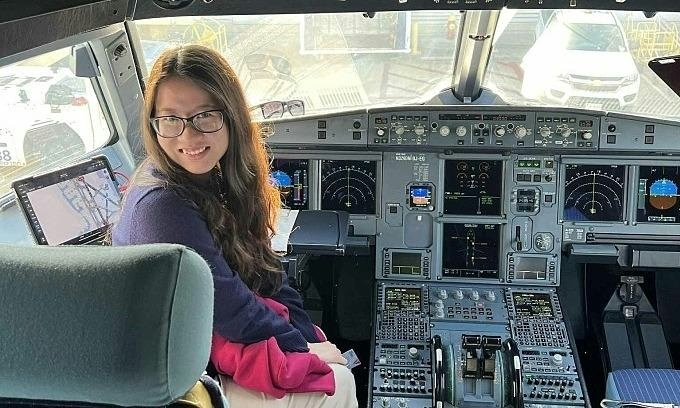AeroGenie — Your Intelligent Copilot.
Trending
Categories
A Vietnamese Executive Advances AI at America’s Oldest Airline

A Vietnamese Executive Advances AI at America’s Oldest Airline
Nguyen Khanh Vy’s remarkable journey from an economics graduate in Ho Chi Minh City to a leading artificial intelligence specialist at Delta Air Lines exemplifies the transformative potential of bold career shifts. At just 28 years old, Vy is a key member of Delta’s machine learning and AI team, contributing to the operations of one of the oldest and largest airlines in the United States, which manages nearly 4,000 flights daily across the globe.
Driving Innovation Through AI at Delta
Vy’s team focuses on developing AI tools that analyze extensive operational data to optimize critical aspects of airline management, including gate assignments, route planning, and weather-related decision-making. One of her recent achievements involved spearheading the implementation of an AI system designed to summarize lengthy post-flight reports submitted by pilots. These reports, often described by pilots as “letters from the heart,” detail issues encountered during flights. Handling thousands of such reports manually had become impractical, but since adopting the AI tool, processing efficiency has improved markedly. Vy explained, “The processing efficiency has improved significantly since the airline adopted this AI tool.”
Her path to this role was unconventional. After earning an economics degree in 2019, Vy pursued an MBA in Florida and worked in data management at a U.S. consumer goods company. Recognizing the need to deepen her technical expertise, she left to pursue a master’s degree in data science at the University of Pennsylvania. There, a course on AI reasoning and the rise of generative AI technologies such as ChatGPT intensified her interest. She immersed herself in research, critically evaluating AI systems and engaging with numerous academic papers weekly. “I gradually realized AI would play a crucial role in every field, including data, so I decided to dig deeper,” she recalled.
During her studies, Vy developed AI applications including a research summarizer for IEEE and a chatbot designed to support psychological research. After graduating in late 2024, she secured her position at Delta following a rigorous six-stage selection process that assessed both her technical skills and cultural fit within the company.
The Broader Context of AI Integration in Industry
As Delta and other major corporations integrate AI into their core operations, they confront challenges that extend beyond technology alone. The Forbes Research 2025 AI Survey highlights that C-suite executives emphasize the importance of building employee trust and facilitating workforce adaptation to new AI tools without fear of job displacement. Market responses often include skepticism toward AI-driven changes, while competitors rapidly adopt similar innovations to maintain competitive advantage. The experience of companies like Salesforce, which reportedly saves $100 million annually through AI-enhanced customer service, underscores the significant operational efficiencies achievable through well-executed AI strategies.
Beyond her professional responsibilities at Delta, Vy is dedicated to democratizing AI knowledge. She actively shares her expertise with young learners, teaching advanced groups how to train AI models on specialized datasets and integrate tools like ChatGPT into practical workflows. For broader audiences, she demonstrates accessible applications such as using AI to learn English and crafting effective prompts. Dinh Ngoc Thanh, vice president of the Global Vietnamese Young Intellectuals Network, commended Vy’s ability to demystify AI, noting, “Vy has the talent for sharing knowledge and always prepares her lessons in a clear and structured way.”
Vy advocates for viewing AI as a collaborative partner rather than a replacement. She illustrates this approach by teaching users to conduct research on topics like pollution in Hanoi using ChatGPT—not by requesting generic reports, but by providing clear frameworks, specifying data requirements, and ensuring source transparency. “If we set up the framework, inputs, and outputs clearly with transparency, the results will be much better,” she emphasized.

Emirates Unveils Cabin Design for New Boeing 777X

Eighteen Years On, the Airbus A380 Remains Central to a $34 Billion Airline

How a boom in luxury airline seats is slowing down jet deliveries

Navitaire Outage Attributed to Planned Maintenance

DigiYatra Debuts Outside Aviation at India AI Impact Summit

Vietnam Orders Strengthen Boeing’s Commercial Outlook

Airbus Signals Uncertainty Over Future A400M Orders

JobsOhio Awards $2 Million Grant to Hartzell Propeller for Innovation Center

Collins Aerospace Tests Sidekick Autonomy Software on YFQ-42A for U.S. Air Force CCA Program

How the Airbus A350-1000 Compares to the Boeing 777
